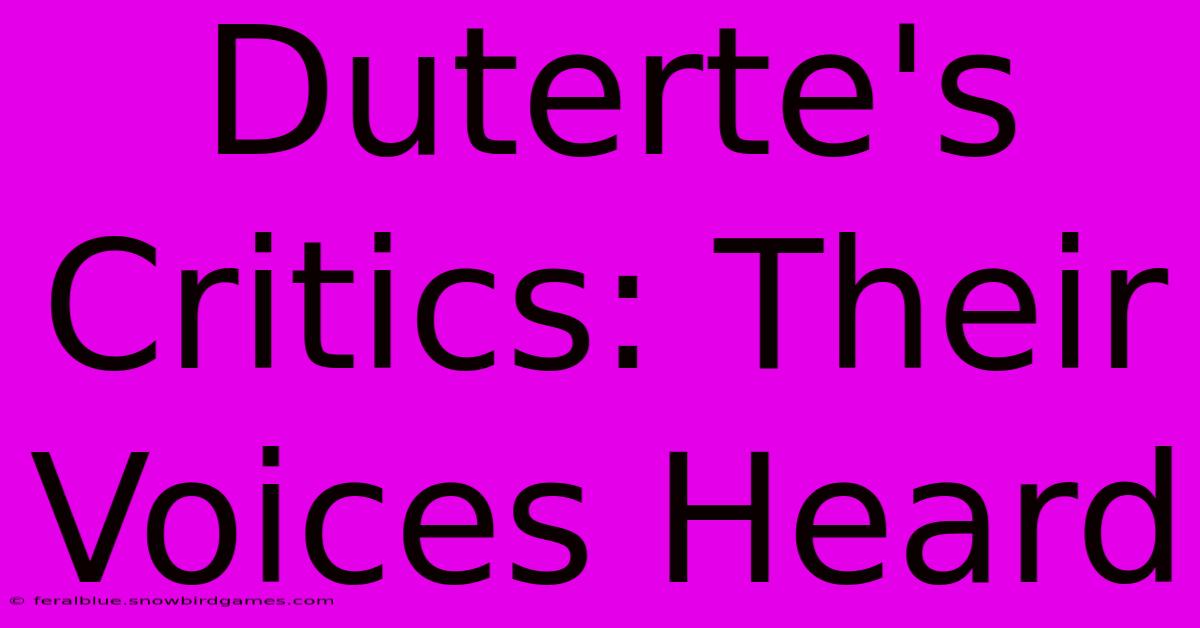Duterte's Critics: Their Voices Heard

Table of Contents
Duterte's Critics: Their Voices Heard
The presidency of Rodrigo Duterte in the Philippines was marked by both fervent support and significant opposition. While his administration championed a "war on drugs" and significant infrastructure projects, a chorus of dissent emerged, raising concerns about human rights, due process, and democratic norms. Understanding these dissenting voices is crucial to a complete picture of his time in office.
The Range of Criticisms
Duterte's critics encompassed a broad spectrum of Philippine society, united by their opposition to certain policies but often diverging on their preferred solutions. Their concerns centered around several key issues:
1. The War on Drugs and Human Rights Violations
The most prominent criticism revolved around the staggering number of deaths associated with the government's anti-drug campaign. Human rights organizations, both domestic and international, documented numerous extrajudicial killings, alleging a culture of impunity and disregard for due process. These accusations fueled widespread international condemnation and damaged the Philippines' reputation. Critics argued that the war on drugs disproportionately targeted vulnerable populations and failed to address the root causes of drug addiction.
2. Attacks on Freedom of Speech and the Press
Duterte's administration faced accusations of suppressing dissent through intimidation and violence against journalists and critics. The climate of fear fostered self-censorship and hampered independent reporting on sensitive issues. Many journalists felt pressured to avoid critical coverage, leading to concerns about the erosion of press freedom. This created a chilling effect on public discourse and limited the ability of citizens to access diverse perspectives.
3. Erosion of Democratic Institutions
Critics raised concerns about the weakening of democratic institutions under Duterte's leadership. The attacks on the judiciary, the legislature, and independent commissions raised questions about the balance of power and the rule of law. This erosion of checks and balances, they argued, paved the way for authoritarian tendencies. The weakening of these institutions, coupled with the suppression of dissent, significantly threatened the foundation of Philippine democracy.
4. Authoritarian Style of Governance
Duterte's leadership style, characterized by strongman rhetoric and a disregard for conventional political norms, alienated many Filipinos. His frequent use of inflammatory language and personal attacks on opponents contributed to a climate of polarization and intolerance. Critics argued that this authoritarian style of governance was incompatible with a healthy democracy and undermined the principles of respect for opposing views. This style frequently marginalized alternative perspectives and fostered a sense of unease among citizens.
Amplifying the Voices of Dissent
Despite the challenges, critics found ways to make their voices heard:
- Protests and demonstrations: Large-scale protests and demonstrations provided a visible platform for dissent, allowing critics to collectively express their opposition to government policies.
- Independent media outlets: While facing pressure, some independent media outlets persevered in their efforts to provide critical reporting and counter the official narrative.
- International human rights organizations: International bodies played a crucial role in documenting human rights violations and advocating for accountability.
- Social media: Social media platforms became important avenues for disseminating information, organizing protests, and fostering dialogue among critics.
Conclusion: A Legacy of Contention
The legacy of Duterte's presidency is undeniably complex and contentious. While his supporters point to infrastructure development and a crackdown on crime, his critics emphasize the profound human rights abuses and the erosion of democratic institutions. Understanding the voices and concerns of his opponents is essential for a comprehensive analysis of his administration's impact on the Philippines and its future. The ongoing discussions surrounding his policies serve as a reminder of the importance of safeguarding human rights, upholding democratic principles, and ensuring that all voices are heard, even amidst intense political polarization.

Thank you for visiting our website wich cover about Duterte's Critics: Their Voices Heard. We hope the information provided has been useful to you. Feel free to contact us if you have any questions or need further assistance. See you next time and dont miss to bookmark.
Featured Posts
-
Paras Shah Son Overcoming Obstacles
Apr 02, 2025
-
Malie Donn A Timeless Icon Of Beauty And Grace
Apr 02, 2025
-
Cm Punks Daughter Embracing Her Future
Apr 02, 2025
-
Carly Teen Mom A Tale Of Resilience And Hope
Apr 02, 2025
-
Marvel Contest Of Champions Cheat And Conquer
Apr 02, 2025
